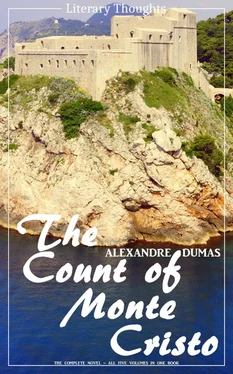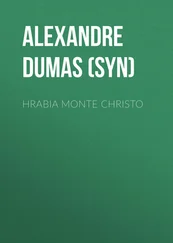"Very good," resumed Danglars; "now your revenge looks like common-sense, for in no way can it revert to yourself, and the matter will thus work its own way; there is nothing to do now but fold the letter as I am doing, and write upon it, 'To the king's attorney,' and that's all settled." And Danglars wrote the address as he spoke.
"Yes, and that's all settled!" exclaimed Caderousse, who, by a last effort of intellect, had followed the reading of the letter, and instinctively comprehended all the misery which such a denunciation must entail. "Yes, and that's all settled; only it will be an infamous shame;" and he stretched out his hand to reach the letter.
"Yes," said Danglars, taking it from beyond his reach; "and as what I say and do is merely in jest, and I, amongst the first and foremost, should be sorry if anything happened to Dantes – the worthy Dantes – look here!" And taking the letter, he squeezed it up in his hands and threw it into a corner of the arbor.
"All right!" said Caderousse. "Dantes is my friend, and I won't have him ill-used."
"And who thinks of using him ill? Certainly neither I nor Fernand," said Danglars, rising and looking at the young man, who still remained seated, but whose eye was fixed on the denunciatory sheet of paper flung into the corner.
"In this case," replied Caderousse, "let's have some more wine. I wish to drink to the health of Edmond and the lovely Mercedes."
"You have had too much already, drunkard," said Danglars; "and if you continue, you will be compelled to sleep here, because unable to stand on your legs."
"I?" said Caderousse, rising with all the offended dignity of a drunken man, "I can't keep on my legs? Why, I'll wager I can go up into the belfry of the Accoules, and without staggering, too!"
"Done!" said Danglars, "I'll take your bet; but to-morrow – to-day it is time to return. Give me your arm, and let us go."
"Very well, let us go," said Caderousse; "but I don't want your arm at all. Come, Fernand, won't you return to Marseilles with us?"
"No," said Fernand; "I shall return to the Catalans."
"You're wrong. Come with us to Marseilles – come along."
"I will not."
"What do you mean? you will not? Well, just as you like, my prince; there's liberty for all the world. Come along, Danglars, and let the young gentleman return to the Catalans if he chooses."
Danglars took advantage of Caderousse's temper at the moment, to take him off towards Marseilles by the Porte Saint-Victor, staggering as he went.
When they had advanced about twenty yards, Danglars looked back and saw Fernand stoop, pick up the crumpled paper, and putting it into his pocket then rush out of the arbor towards Pillon.
"Well," said Caderousse, "why, what a lie he told! He said he was going to the Catalans, and he is going to the city. Hallo, Fernand!"
"Oh, you don't see straight," said Danglars; "he's gone right enough."
"Well," said Caderousse, "I should have said not – how treacherous wine is!"
"Come, come," said Danglars to himself, "now the thing is at work and it will effect its purpose unassisted."
Chapter 5 – The Marriage-Feast.
The morning's sun rose clear and resplendent, touching the foamy waves into a network of ruby-tinted light.
The feast had been made ready on the second floor at La Reserve, with whose arbor the reader is already familiar. The apartment destined for the purpose was spacious and lighted by a number of windows, over each of which was written in golden letters for some inexplicable reason the name of one of the principal cities of France; beneath these windows a wooden balcony extended the entire length of the house. And although the entertainment was fixed for twelve o'clock, an hour previous to that time the balcony was filled with impatient and expectant guests, consisting of the favored part of the crew of the Pharaon, and other personal friends of the bride-groom, the whole of whom had arrayed themselves in their choicest costumes, in order to do greater honor to the occasion.
Various rumors were afloat to the effect that the owners of the Pharaon had promised to attend the nuptial feast; but all seemed unanimous in doubting that an act of such rare and exceeding condescension could possibly be intended.
Danglars, however, who now made his appearance, accompanied by Caderousse, effectually confirmed the report, stating that he had recently conversed with M. Morrel, who had himself assured him of his intention to dine at La Reserve.
In fact, a moment later M. Morrel appeared and was saluted with an enthusiastic burst of applause from the crew of the Pharaon, who hailed the visit of the shipowner as a sure indication that the man whose wedding feast he thus delighted to honor would ere long be first in command of the ship; and as Dantes was universally beloved on board his vessel, the sailors put no restraint on their tumultuous joy at finding that the opinion and choice of their superiors so exactly coincided with their own.
With the entrance of M. Morrel, Danglars and Caderousse were despatched in search of the bride-groom to convey to him the intelligence of the arrival of the important personage whose coming had created such a lively sensation, and to beseech him to make haste.
Danglars and Caderousse set off upon their errand at full speed; but ere they had gone many steps they perceived a group advancing towards them, composed of the betrothed pair, a party of young girls in attendance on the bride, by whose side walked Dantes' father; the whole brought up by Fernand, whose lips wore their usual sinister smile.
Neither Mercedes nor Edmond observed the strange expression of his countenance; they were so happy that they were conscious only of the sunshine and the presence of each other.
Having acquitted themselves of their errand, and exchanged a hearty shake of the hand with Edmond, Danglars and Caderousse took their places beside Fernand and old Dantes, – the latter of whom attracted universal notice. The old man was attired in a suit of glistening watered silk, trimmed with steel buttons, beautifully cut and polished. His thin but wiry legs were arrayed in a pair of richly embroidered clocked stockings, evidently of English manufacture, while from his three-cornered hat depended a long streaming knot of white and blue ribbons. Thus he came along, supporting himself on a curiously carved stick, his aged countenance lit up with happiness, looking for all the world like one of the aged dandies of 1796, parading the newly opened gardens of the Tuileries and Luxembourg. Beside him glided Caderousse, whose desire to partake of the good things provided for the wedding-party had induced him to become reconciled to the Dantes, father and son, although there still lingered in his mind a faint and unperfect recollection of the events of the preceding night; just as the brain retains on waking in the morning the dim and misty outline of a dream.
As Danglars approached the disappointed lover, he cast on him a look of deep meaning, while Fernand, as he slowly paced behind the happy pair, who seemed, in their own unmixed content, to have entirely forgotten that such a being as himself existed, was pale and abstracted; occasionally, however, a deep flush would overspread his countenance, and a nervous contraction distort his features, while, with an agitated and restless gaze, he would glance in the direction of Marseilles, like one who either anticipated or foresaw some great and important event.
Dantes himself was simply, but becomingly, clad in the dress peculiar to the merchant service – a costume somewhat between a military and a civil garb; and with his fine countenance, radiant with joy and happiness, a more perfect specimen of manly beauty could scarcely be imagined.
Lovely as the Greek girls of Cyprus or Chios, Mercedes boasted the same bright flashing eyes of jet, and ripe, round, coral lips. She moved with the light, free step of an Arlesienne or an Andalusian. One more practiced in the arts of great cities would have hid her blushes beneath a veil, or, at least, have cast down her thickly fringed lashes, so as to have concealed the liquid lustre of her animated eyes; but, on the contrary, the delighted girl looked around her with a smile that seemed to say: "If you are my friends, rejoice with me, for I am very happy."
Читать дальше












